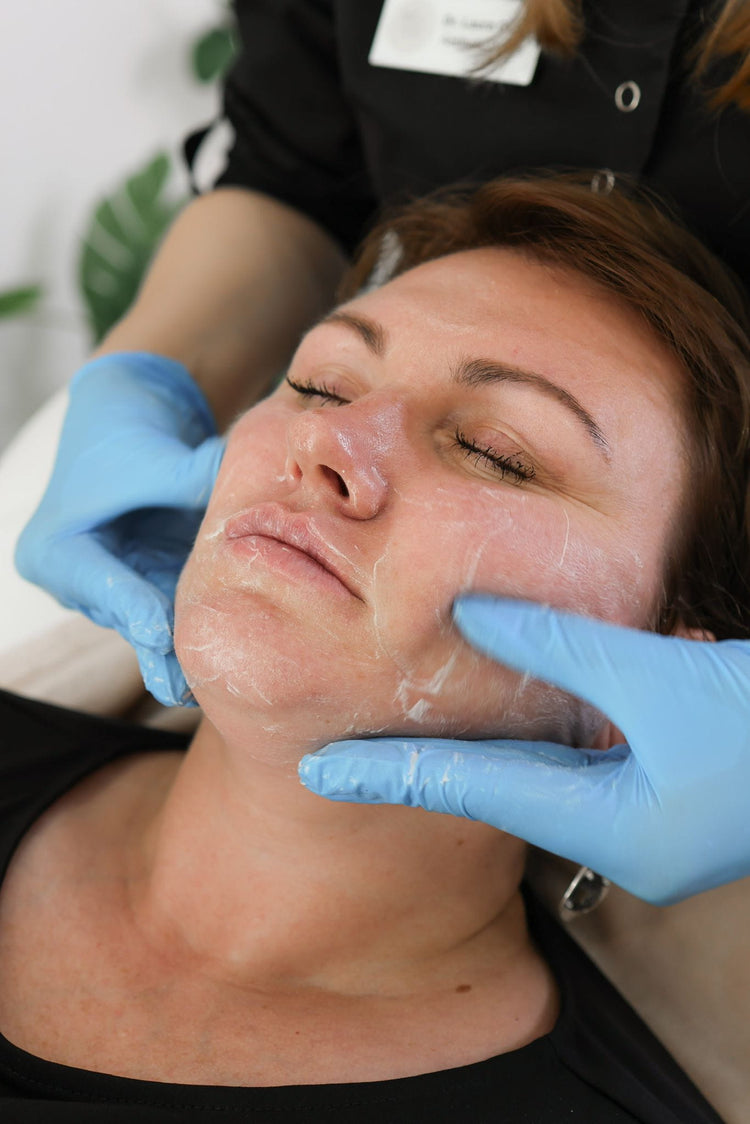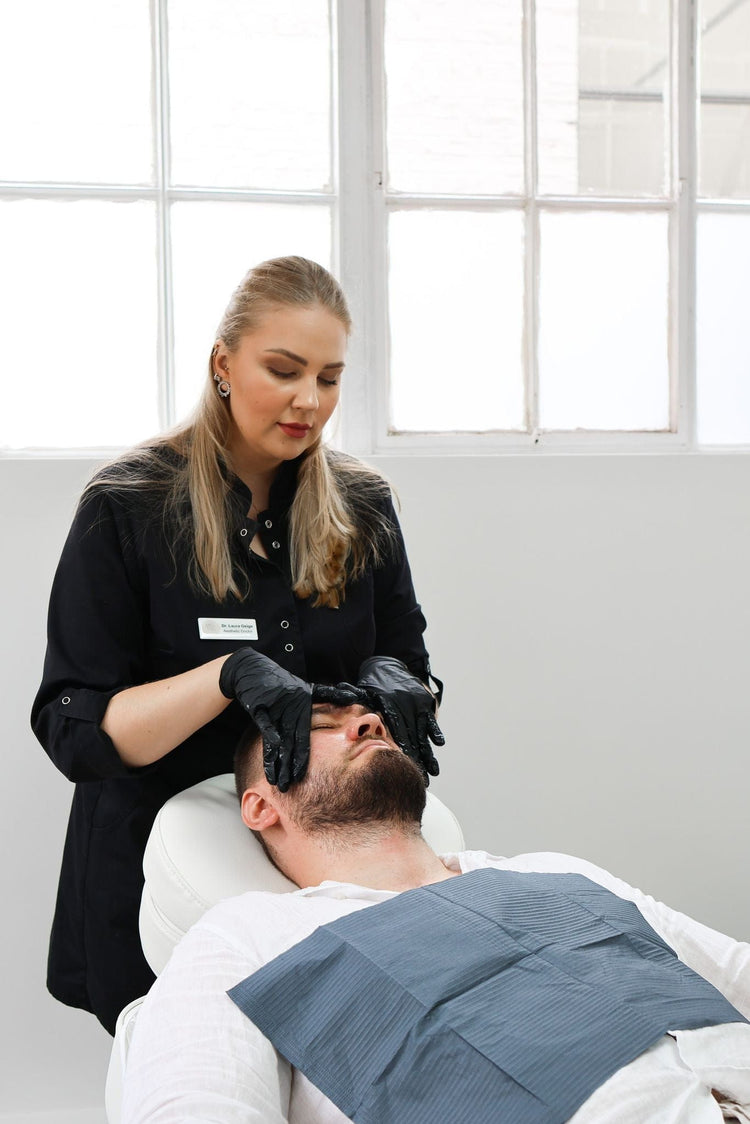Understanding Skin Hydration Needs
Understanding your skin’s individual hydration needs is crucial for achieving a healthy, radiant complexion. Skin type, lifestyle factors, and environmental conditions all influence how much moisture your skin requires.
Identifying Skin Type
To determine your skin’s hydration needs, it’s essential to identify your skin type. Common skin types include oily, dry, combination, sensitive, and normal. Oily skin tends to produce excess sebum, requiring lighter moisturizers or oil-free products. Dry skin lacks moisture and benefits from richer creams and serums with humectants like hyaluronic acid. Combination skin exhibits both oily and dry areas, necessitating tailored hydration strategies. Sensitive skin is prone to irritation and requires gentle, hypoallergenic products. Normal skin has a balanced sebum production and can generally tolerate a variety of moisturizers.
Analyzing Existing Skincare Routine
A skincare consultation provides valuable insights into your unique skin characteristics and helps tailor a hydration strategy that addresses your specific needs. During the consultation, a trained esthetician or dermatologist will analyze your skin type, lifestyle habits, and environmental exposures.
They will assess your current skincare routine, identifying potential areas for improvement. This may involve examining the products you’re using, their ingredients, and the frequency of application. The consultation can also shed light on any underlying skin conditions that might be affecting hydration levels.
Assessing Environmental Factors
Environmental factors play a significant role in skin hydration. Extreme temperatures, both hot and cold, can disrupt the skin’s natural moisture barrier, leading to dryness or excessive oil production.
Humidity levels also impact skin hydration. Low humidity draws moisture from the skin, causing it to feel tight and flaky, while high humidity can trap sweat and exacerbate oily skin.
Exposure to pollutants, sun damage, and wind can further compromise the skin’s protective barrier, making it more susceptible to dehydration.
Tailored Skincare Recommendations
Achieving optimal skin hydration requires understanding your unique skin needs. Factors like skin type, lifestyle, and environmental conditions all influence how much moisture your skin requires.
Choosing Hydrating Ingredients
When choosing hydrating ingredients for your skincare routine, consider the specific needs of your skin type. Hyaluronic acid is a powerful humectant that attracts and retains moisture, making it suitable for all skin types, particularly dry or dehydrated skin. Ceramides are essential lipids that help maintain the skin’s protective barrier, improving hydration and reducing water loss.
Glycerin is another excellent humectant that draws moisture from the air to hydrate the skin. For oily or acne-prone skin, look for lightweight hydrators like aloe vera gel or niacinamide, which can balance oil production and soothe inflammation without clogging pores.
Product Selection Based on Skin Concerns
Skincare consultations are instrumental in boosting skin hydration by providing personalized recommendations based on individual skin concerns. During a consultation, a trained professional will analyze your skin type, lifestyle habits, and environmental exposures to determine your unique hydration needs.
They will assess your current skincare routine, identify potential areas for improvement, and recommend specific products or ingredients tailored to address your concerns.
For example, someone with dry skin may be advised to use a rich moisturizer containing hyaluronic acid and ceramides, while someone with oily skin might benefit from a lightweight gel or serum with aloe vera or niacinamide.
Frequency and Application Techniques
A skincare consultation can significantly enhance your skin’s hydration levels. A trained professional will assess your specific skin type, lifestyle factors, and environmental influences to determine your unique hydration needs.
They can guide you on choosing the right products and ingredients for your skin type, frequency of application, and optimal techniques.
For instance, someone with dry skin might benefit from thicker creams containing hyaluronic acid and ceramides, applied twice daily. Someone with oily skin may require lighter moisturizers or serums with oil-free formulas and humectants like glycerin, used once or twice a day.
The consultation can also help identify any underlying skin conditions that might be hindering hydration, allowing for targeted treatment strategies.
Professional Guidance and Support

Achieving optimal skin hydration is essential for a healthy, radiant complexion. Skin type, lifestyle factors, and environmental conditions all influence how much moisture your skin requires.
Addressing Skin Barrier Issues
Understanding your skin’s individual hydration needs is crucial for achieving a healthy, radiant complexion.
To determine your skin’s hydration needs, it’s essential to identify your skin type. Common skin types include:
- Oily skin tends to produce excess sebum, requiring lighter moisturizers or oil-free products.
- Dry skin lacks moisture and benefits from richer creams and serums with humectants like hyaluronic acid.
- Combination skin exhibits both oily and dry areas, necessitating tailored hydration strategies.
- Sensitive skin is prone to irritation and requires gentle, hypoallergenic products.
- Normal skin has a balanced sebum production and can generally tolerate a variety of moisturizers.
Skincare consultations are instrumental in boosting skin hydration by providing personalized recommendations based on individual skin concerns. During a consultation, a trained professional will analyze your skin type, lifestyle habits, and environmental exposures to determine your unique hydration needs.
They will assess your current skincare routine, identify potential areas for improvement, and recommend specific products or ingredients tailored to address your concerns.
Monitoring Progress and Adjustments
Skincare consultations play a crucial role in achieving optimal skin hydration by providing personalized guidance and support. A trained esthetician or dermatologist will analyze your unique skin characteristics, lifestyle factors, and environmental exposures to determine your individual hydration needs.
During the consultation, they will assess your current skincare routine, identify any areas for improvement, and recommend specific products or ingredients tailored to address your concerns.
This personalized approach ensures that you are using the most effective strategies to hydrate your skin effectively.
Throughout your skincare journey, regular monitoring of progress is essential. This involves observing how your skin responds to the recommended routine and making adjustments as needed.
Your esthetician or dermatologist may suggest follow-up consultations to evaluate the effectiveness of your skincare regimen and make necessary modifications based on any changes in your skin condition or lifestyle.

Long-Term Hydration Strategies
Understanding your skin’s individual hydration needs is crucial for achieving a healthy, radiant complexion. Skin type, lifestyle factors, and environmental conditions all influence how much moisture your skin requires.
To determine your skin’s hydration needs, it’s essential to identify your skin type. Common skin types include oily, dry, combination, sensitive, and normal. Oily skin tends to produce excess sebum, requiring lighter moisturizers or oil-free products. Dry skin lacks moisture and benefits from richer creams and serums with humectants like hyaluronic acid. Combination skin exhibits both oily and dry areas, necessitating tailored hydration strategies. Sensitive skin is prone to irritation and requires gentle, hypoallergenic products. Normal skin has a balanced sebum production and can generally tolerate a variety of moisturizers.
A skincare consultation provides valuable insights into your unique skin characteristics and helps tailor a hydration strategy that addresses your specific needs. During the consultation, a trained esthetician or dermatologist will analyze your skin type, lifestyle habits, and environmental exposures.
They will assess your current skincare routine, identifying potential areas for improvement. This may involve examining the products you’re using, their ingredients, and the frequency of application. The consultation can also shed light on any underlying skin conditions that might be affecting hydration levels.
Environmental factors play a significant role in skin hydration. Extreme temperatures, both hot and cold, can disrupt the skin’s natural moisture barrier, leading to dryness or excessive oil production.
Humidity levels also impact skin hydration. Low humidity draws moisture from the skin, causing it to feel tight and flaky, while high humidity can trap sweat and exacerbate oily skin.
Exposure to pollutants, sun damage, and wind can further compromise the skin’s protective barrier, making it more susceptible to dehydration.
Achieving optimal skin hydration requires understanding your unique skin needs.
When choosing hydrating ingredients for your skincare routine, consider the specific needs of your skin type. Hyaluronic acid is a powerful humectant that attracts and retains moisture, making it suitable for all skin types, particularly dry or dehydrated skin. Ceramides are essential lipids that help maintain the skin’s protective barrier, improving hydration and reducing water loss.
Glycerin is another excellent humectant that draws moisture from the air to hydrate the skin. For oily or acne-prone skin, look for lightweight hydrators like aloe vera gel or niacinamide, which can balance oil production and soothe inflammation without clogging pores.
Skincare consultations are instrumental in boosting skin hydration by providing personalized recommendations based on individual skin concerns. During a consultation, a trained professional will analyze your skin type, lifestyle habits, and environmental exposures to determine your unique hydration needs.
They will assess your current skincare routine, identify potential areas for improvement, and recommend specific products or ingredients tailored to address your concerns.
For example, someone with dry skin may be advised to use a rich moisturizer containing hyaluronic acid and ceramides, while someone with oily skin might benefit from a lightweight gel or serum with aloe vera or niacinamide.
A skincare consultation can significantly enhance your skin’s hydration levels. A trained professional will assess your specific skin type, lifestyle factors, and environmental influences to determine your unique hydration needs.
They can guide you on choosing the right products and ingredients for your skin type, frequency of application, and optimal techniques.
For instance, someone with dry skin might benefit from thicker creams containing hyaluronic acid and ceramides, applied twice daily. Someone with oily skin may require lighter moisturizers or serums with oil-free formulas and humectants like glycerin, used once or twice a day.
The consultation can also help identify any underlying skin conditions that might be hindering hydration, allowing for targeted treatment strategies.
Achieving optimal skin hydration is essential for a healthy, radiant complexion. Skin type, lifestyle factors, and environmental conditions all influence how much moisture your skin requires.
Understanding your skin’s individual hydration needs is crucial for achieving a healthy, radiant complexion.
Learn more about acne treatments at It’s Me & You Clinic with Dr. Laura Geige
- Why Does My Lip Filler Swell Sometimes - November 1, 2025
- What Is The Difference Between Dermal Fillers And Bum Filler Injections? - October 29, 2025
- What Are The Best CBD Gummy Sweets For Pain Relief - October 28, 2025

